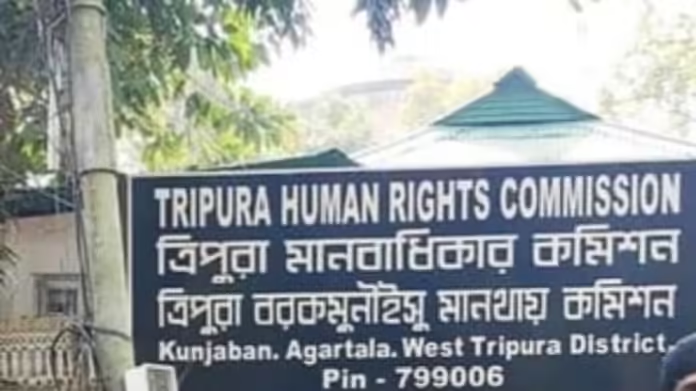The Tripura Human Rights Commission (THRC) has taken swift action following the death of a person in alleged police custody. Acting on its own, the commission has directed Director General of Police (DGP) Amitab Ranjan to conduct a thorough investigation into the matter. The commission’s instructions demand that an interim inquiry report be submitted within 15 days, bringing the incident under immediate scrutiny. The custodial death has triggered widespread concern, with the human rights body stepping in quickly to ensure that the situation is addressed properly.
The incident reportedly occurred while the person was in the custody of Tripura Police. Allegations of custodial torture surfaced shortly after the death, sparking outrage from local communities and rights groups. The THRC’s decision to take suo motu cognizance demonstrates its commitment to ensuring accountability within law enforcement and protecting the rights of individuals in custody. The commission’s intervention is seen as a crucial step toward ensuring transparency in the investigation process.
The case has raised important questions about the treatment of individuals in custody and the procedures followed by law enforcement officers. Custodial deaths often cast a long shadow over the relationship between the police and the public. Allegations of torture and mistreatment in custody can undermine the trust that citizens place in the justice system. It’s in this context that the THRC’s prompt action becomes significant. The commission’s involvement signals that the state must ensure that law enforcement practices are in line with human rights standards.
Director General of Police Amitab Ranjan is now tasked with conducting a thorough investigation into the incident and reporting back within the stipulated time frame. While the DGP’s response to the THRC’s directive remains to be seen, his role in ensuring that a fair and impartial inquiry takes place is now under the spotlight. Ranjan’s leadership in handling such sensitive cases will be crucial in determining the outcome of the investigation.
The deceased individual’s family has raised serious concerns about the circumstances leading up to the death. They have alleged that the person was subjected to physical and mental torture while in police custody. These claims have added weight to the THRC’s decision to take action. The family’s grief and demand for justice are echoed by local activists and human rights advocates, who have called for a transparent and independent inquiry into the matter.
In recent years, custodial deaths have become a flashpoint in India’s law enforcement system. Cases like these often lead to larger debates on police reforms, the need for greater oversight, and the importance of protecting citizens’ rights while in custody. The THRC’s decision to act swiftly may help shed light on whether proper procedures were followed in this particular case. The next steps will be crucial in determining whether the Tripura Police adhered to the law and acted appropriately during the time the deceased was in custody.
While the THRC’s directive calls for an interim report within 15 days, the long-term outcome of this case remains uncertain. Much will depend on the evidence gathered during the inquiry and whether it corroborates the family’s claims of torture. The role of forensic examinations, witness statements, and other key pieces of evidence will play a pivotal role in the inquiry process.
Rights groups across the country will be watching the developments in this case closely. Custodial deaths are a national issue that affect all parts of India, and cases like these serve as a reminder of the challenges that law enforcement faces in maintaining transparency and upholding the rule of law. In Tripura, the state’s human rights commission has set a precedent by taking immediate action, but the real test lies in ensuring that justice is served fairly and swiftly.
The outcome of the investigation will likely have far-reaching implications for both the Tripura Police and the state’s human rights record. It remains to be seen how DGP Amitab Ranjan will handle the inquiry, but one thing is clear—this case has ignited discussions about police accountability and the need for reform in custodial practices.


